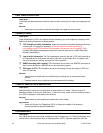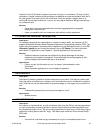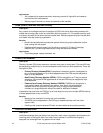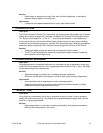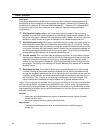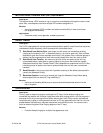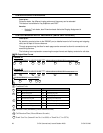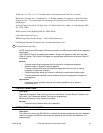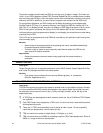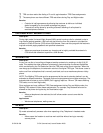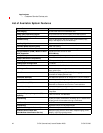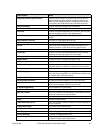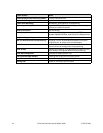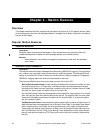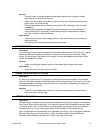
40 S-ICX (International) issued October 2000 S-ICX-50-200
The phone numbers stored inside the SSD bins can be up to 24 digits in length. End-users can
“chain” up to 6 SSDs together inside a PSD (Personal Speed Dial) bin, to handle phone numbers
that are longer than 24 digits. Also, the system can be set to automatically access a trunk group
whenever an SSD is dialed (so you won’t have to program trunk access into the SSD bins).
On a proprietary telephone, an SSD number can be dialed by pressing a pre-programmed
Flexible Feature (FF) key, or by pressing “Memory” and dialing the SSD bin number (00-79 or
000-799). Or, on display phones, the user can display an SSD Index that shows a list of current
SSDs in the system, and press the soft key next to the desired SSD to dial it automatically.
Individual phones can be programmed to display (or not display) the actual phone number being
outpulsed for the SSD.
The S-ICX can be programmed so that SSDs will override any toll restrictions (call barring) that
would normally apply.
Benefits:
• Saves time and increases productivity by allowing the user to use abbreviated dialing
to access frequently-called numbers.
• Provides a way for users to store frequently-used feature codes into SSD bins for
easy, one-touch feature activation.
Applications:
• General business environment where many people call the same locations or
customers
TENANT GROUPS
Description:
Tenant Groups allow you to separate extensions, trunks, MCO Access, System Speed Dial Bins,
and Virtual Port Assignments within the same system.
Benefits:
• One system can provide service for several different groups (i.e., companies,
divisions, departments, etc.)
TOLL RESTRICTION SERVICE (TRS/CALL BARRING)
Description:
TRS/Call Barring lets you control user access to outside lines on a per-station and per-line basis.
It can be combined with ARS to block calls based on the number dialed, the outside line used,
the extension phone used, the time of day (via Day and Night modes), and/or the day of the
week/month/year.
❣ A TRS Class can be assigned to each extension and trunk. Up to 50 different TRS Classes
are available.
❣ Each TRS Class is then assigned to a TRS Level. It is this Level that is used as the basis for
allowing/restricting calls.
❣ There are 10 TRS Levels available. Level 0 denies all calls. Levels 1-8 can be partially
restrictive per assignments. Level 9 allows all calls.
❣ TRS can restrict the number of digits dialed (1-20 digits, or no limit).
❣ TRS can restrict the use of SSDs for outdialing, based on TRS Class assignments. Either all
SSDs or a range of them can be restricted.



